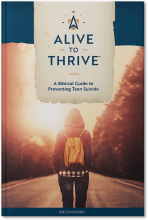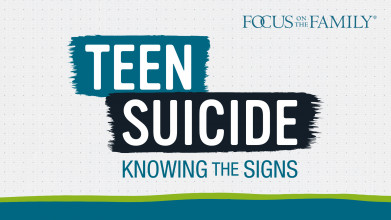
The War of Words
In this Adventures in Odyssey drama, a carelessly uttered word from Eugene creates havoc as it becomes the fashionable insult, resulting in a lesson about the power of words.
Home » Episodes » Focus on the Family Broadcast » Understanding Teen Depression and Suicide (Part 2 of 2)
John Fuller: What can you do if your teenager is struggling with depression? Dr. Gregory Jantz shares these professional insights.
Excerpt:
Dr. Gregory Jantz: So often, I hear parents say, I wish I would’ve done something sooner. I wish I would’ve- so, you’re gonna get resistance, so just know it. If it’s a season for a professional intervention and a counselor, do it! You won’t regret it!
End of Excerpt
John: Get help for your child if they need it. You’re going to be hearing more from Dr. Jantz on today’s episode of Focus on the Family. Your host is Focus president and author, Jim Daly, and I’m John Fuller.
Jim Daly: John, last time we started an important discussion for parents on teens, and learned what normal teen behavior includes. And I know for moms and dads listening, you’re gonna say, that is my teenager. And we get it. Um, it can be a roller coaster ride. We get that as well. We also talked about some warning signs of depression. And that’s really our focus – depression, and even suicide. And that’s true within the church as well, and we need to be, I think, more in tune with those signs. That’s why we’re doing the program, so you as a parent can see those signs of depression, understand what’s taking place, and be that frontline defense for your teenager. And, uh, that is our goal today, to equip you to be engaged at that level of your relationship with your teen.
John: And Dr. Gregory Jantz, as I said, is our guest again today. Uh, he was with us last time. And you can get the CD or download, or listen again on the app, all available at focusonthefamily.com/radio. He is a psychologist and the author of dozens of books, including, uh, this is an unusual one, Dr. Jantz, because the subtitle precedes the title, so it’s,When Your Teenager Becomes The Stranger In Your House. And the picture is great. Uh, it’s a red door with a bunch of “keep out,” uh, tape on top of it. That really captures the essence of what we’re talking about today.
Greg: And it may feel like you have a stranger in the house, and you are asking that question – who is living here now?
Jim: That could be a hundred percent of parents with teens in the house, you do realize that?
Greg: It’s a season, though. It’s a season.
Jim: We left off last time, and, John, you mentioned it – if you missed it, get it. I mean, this is one of those tools that you need as a parent. And we can give you the, CD or the download. Just get in touch with us. John will give those details later. But, Dr. Jantz, we left off with the description of the three characteristics of depression.
Greg: Sure.
Jim: Let’s hit those again before we start today.
Greg: Some of the warning signs is – now, remember there’s some normal transition, but the warning signs – number one is the frequency of these symptoms. Is this happening all the time? Are we seeing it over a period of time? – so that’s the duration. Has this been going on for six months?
Jim: And those behaviors could be reclusiveness, just detached.
Greg: Detached. We are not seeing them, enjoy things they usually would enjoy. They’re not wanting to participate. Uh, teenage depression, and we’ll talk about – sometimes a girl may show it differently than a boy, but, we know that these symptoms don’t go away. So that’s one of the characteristics. And again, how severe are these? You know, there’s having a bad day. And then there’s, every day is bad.
Jim: Right– and that would leaning toward more depression. So here we go. Dr. Jantz Let’s go right there. How do boys and girls manifest depression differently?
Greg: Sure, and I’m going to make some generalities.
Jim: Is that politically correct to even say they do?
Greg: Well, we know they do. And if you’ve lived with a – a boy or a girl who has struggled with issues, you know they express them differently.
Jim: All right, describe it.
Greg: OK. A boy may become more reclusive. They’re going to, maybe, pull back and withdraw. And they’re going to oftentimes turn it into anger. So if something has been – happened, I’ve been hurt. A boy may express it through anger or aggression and, I can handle this on my own. And they’re going to, uh, withhold showing a lot of other emotion. So you may see more anger coming from the boy, and if they have felt a sense of betrayal from friends – and betrayal in boys is very interesting to observe. Because betrayal, a lot of times a boy feels like, I have to get even. I am going to do something…Something back. OK, so they’re struggling. They’re struggling with depression. They’re struggling with anger. ‘Cause, see, depression is really a combination of a lot of different symptoms. Um, so they – I like to say, a lot of times, they’ve been really hurt or emotionally injured, and it’s coming out through depression. Now, a girl, you may see a lot more tears. She may be a lot more verbal. She’s putting her feelings into words a lot easier. Because you may ask your son, what is going on with you? And are you OK? I’m fine.
Jim: Right, so that’s it.
Greg: And that’s where the conversation ends – their one or two-word answers. You ask your daughter, sweetheart, what’s going on? I’m concerned about you. And, and you get it all. And you get the emotion, and you get the tears, and you get a lot of words.
Jim: Yeah. Hitting the issue and the topic of suicide, teen-adolescent suicide is off the charts right now. And we talked a bit about that at the top of the show last time – just what’s happening…
Greg: Yes.
Jim: …In the mind of a teenager – all the desperation, not measuring up, all the technology that allows others to measure you, you know, the Snapchat thing and other social media.
Greg: Right.
Jim: Are you the greatest, the best, the whatever? And bullying – cyberbullying…
Greg: Right.
Jim: that’s occurring – all those things in addition to the things that we all kind of went through as teenagers back when. When you see that – let’s talk more specifically about potential movement from depression to having suicidal thoughts.
Greg: Yes.
Jim: I was stunned by one of the stats. It was amazing – the number of young people that attempt suicide. Do you remember that number?
Greg: Well, they attempt, and it’s…
Jim: 8.6 percent of teenagers.
Greg: And it’s hard to get accurate numbers because, you know, to get this information – we know it’s a real issue.
Jim: It’s a big number.
Greg: It – they’re big numbers, whatever it is, right?
Jim: Yeah.
Greg: And so here’s what happens. Our kids, these days, suicide is – is so common. And we hear it in the news a lot. And it’s almost seen like it’s one of the options available to you. And that’s frightening to even say that. But it’s like, in our culture, suicide is an option that is available to you.
Now, our teens have usually low impulse control. In other words, they’re impulsive, OK. They’re still working on that. We call it the prefrontal cortex – that – put your hand on your forehead. That’s where all that executive, good decisions are made. OK. Our teenagers are still developing that. And so they’re going to show more signs of being impulsive. Technology’s perfect for being impulsive. I’m one click away from anything, and I can be impulsive all day long with my technology. So if they don’t see options quickly – ‘cause they’re used to seeing – having everything instant. They’re – we’re in an instant culture. So our teenagers are being impulsive with their decisions, and we may see a lot of depression. And if it stays in depression and it moves one notch over to despair, they can be very impulsive. You know, they can have suicide attempts. They’re beginning to entertain thoughts that, well, it would be better if I wasn’t around. I’ll show you guys. I’ll kill myself. And that’s how they’re thinking. They’ve entered an impulsive, unregulated – there’s no filter. They’re seeing that this is an option, and that’s frightening.
Jim: And worse, they may be seeing it as their only option…
Greg: Well…
Jim: …’Cause there won’t be a brighter day…
Greg: Right, Jim.
Jim: …For the person that’s suffering in depression and contemplating suicide. What does the parent do in that moment when you think you’re moving away or moving through depression? Now your teen is talking about suicide. What do you do? Who do you call? What resources are available? I mean, this has been going on now for a week, a month, maybe a year. You know…
Greg: Right.
Jim: …I don’t know who to call.
Greg: Suddenly, they’re – they’re like, oh, it’d be better if I wasn’t around. I – I think I’m just going to kill myself. And maybe you’re seeing that they’re even journaling and writing some dark material. And they’re really not thinking, obviously, with clarity or with any sense of, of hope for their future. Well, if you just spend time trying to talk them out of killing themselves – oh, you don’t want to do that. Killing yourself’s never an option – and if we have that kind of conversation, it may drive it more secret. It’s like, well, I don’t know who to talk to. You – my parents are not even safe. But if I can spend time on tell me more aboutwhat’s really going on? Help me understand, um, what you’re going through. Focus on their – feelings, their experience. What must their experience be?
Jim: What are you hunting for, as the parent, in that moment? What are you trying to find?
Greg: I want to know what happened. Did something happen? What led them down this path that I am feeling like the only option is is to kill myself? Now, because kids are impulsive and because I’m a professional counselor, I am going to move quickly to intervene to get some help. I’m not going to overreact in the moment. But if my kid is talking this way, I am going to take it seriously. And I am going to make sure if they’re not talking to me, I’m going to make sure they’re talking to somebody.
Jim: So get somebody engaged with it.
Greg: I…
Jim: Hopefully they have a relationship…
Greg: So it…
Jim: …With a smart-thinking…
Greg: …It could be a…
Jim: …Adult.
Greg: …Another
Greg: adult. It could be a mentor. It’s going to probably need to be a professional counselor soon, or – we’re going to need to reach out. Plus, reach out yourself and have somebody help you.
Jim: Yeah. Dr. Jantz, I – I need to ask this because I think as a parent, especially for those of us that went through a tough time…
Greg: Yes.
Jim: …And it’s kind of a pick yourself up by your bootstraps orientation. And I’m guilty of that, you know? I was an orphaned kid, and I went through a lot of really bad stuff.
Greg: Right.
Jim: But if you’re that kind of parent that is resilient, that has picked yourself up by your bootstraps, that could be very damaging to say to your 14, 15, 16-year-old – come on, just keep moving…
Greg: Yes.
Jim: …Because they don’t know how.
Greg: They don’t know how, and they may be comparing themselves to you. I can’t – my dad – I know my dad had a rough childhood, and, look, he’s done great. And I just can’t do it. And so those comparisons – when we’re depressed, we tend to do a lot of comparisons and feel unworthy. So it’s different. Being with your kid is different than talking them out of something. We don’t want to talk them out of their feelings. You may be really surprised by something they say and may be shocked by it, but don’t talk them out of their feelings.
Jim: Ah, that’s good.
Greg: They need to know you value them. And whatever it is, it’s OK to share it.
Jim: In that environment, again, I want to – I want parents to hear clearly three no-nos. I mean, just give me that tool, Dr. Jantz. What are three no-nos in that moment I should not do as a parent?
Greg: Don’t lecture (laughter). It’s easy to lecture, by the way. Don’t give them a lecture. And this may sound funny, but don’t talk to them if they’re hungry (laughter).
Jim: OK.
Greg: OK?
Jim: I can understand that with boys.
Greg: Yeah, if your kid hasn’t eaten all day, they’re hungry and they’re irritable, that’s not the time.
Jim: Right.
Greg: …To – so let them eat, and keep your words fairly short. It’s easy to drop into a lecture, so fewer words is probably better. And it’s hard, but you can do it, and it will work eventually.
Jim: Well, and it’s so important. I would say that would be one good takeaway right now. If you’re that parent that tends to lecture, bite your lip. Don’t do it.
Greg: Yeah.
Jim: And try to dig for the gems of your child’s emotions.
John: And once again, our guest on Focus on the Family is Dr. Gregory Jantz. And he’s written a bookWhen Your Teenager Becomes… The Stranger In Your House. He’s got dozens of other books as well. We’ll have some info on our website focusonthefamily.com/radio. And, if you need some counseling, if you’re at a point of wondering, well, maybe I should get some help, call us, and we can talk that through with you. We have caring Christian counselors here on staff. And our number is 800-A-FAMILY.
Jim: And Dr. Jantz, you’ve written another book, and I want to pull from that, which is theFive Keys To Dealing With Depression. What are those five keys?
Greg: Well, we’re going to look at the whole person. One of the keys is there’s a spiritual side to depression. So I’m going to look at what is God’s truth about me and about my situation?
Jim: What is it? Tell me.
Greg: So…
Jim: That’s good for parents to hear.
Greg: Well, one of the things is God has promised that if we seek Him, there is a positive future for our kids, so don’t forget that…
Jim: And that’s what…
Greg: …OK?
Jim: …Jesus – again, he illustrated that with the woman at the well, the woman caught in adultery.
Greg: Yeah.
Jim: King David to go to the Old Testament.
Greg: Yes.
Jim: I mean, he had reason to be depressed.
Greg: Yes. Another key for depression is physical – the physical side of us. People who are depressed stop taking care of themselves. So that self-care, that movement – physical movement – the nutrition – they’ll tend to start doing things like, I’m drinking 20 cups of coffee instead of two, or I’m not taking good care – I’m not drinking water, you know, simple things. But you’ll notice that when you get depressed, your physical self-care really goes down. And that includes sleep. Either I want to sleep all the time or I…
Jim: Or I can’t get any.
Greg: …Can’t sleep at all…
Jim: Yeah.
Greg: …Or I wake up during the night. So the physical side must be addressed as well.
Jim: Uh, what are the other three?
Greg: OK, other keys to dealing with depression – and we keep it really simple – is how am I going to get emotional balance? What’s the predominant emotions that are governing me right now? Is it because I’ve been extremely hurt? Am I angry? Am I feeling guilty? Do I have a lot of fear? So look at what are the predominant emotions that are fueling this. A lot of times, it – it is I’m angry, I’m upset. And how am I going to get that emotional balanceback? Well, if you have too much anger in your life, too much fear, too much guilt, that’s not emotional balance. So we’ve got to look at that. The final one I want to mention, really is what I’ll call relational support. And relationship support is who is speaking into to my life. If I’m depressed, who really believes in me? Have I withdrawn? Am I isolated? Have I cut people off? Because when I’m depressed, I need others.
Jim: Uh, speak to the parent that knows that their teen has nobody other than them.
John: Yeah.
Jim: And how do you go about saying, OK, Johnny, we need to get someone for you. Now, the response, I can only imagine, might be, I don’t want to do that, Dad. I don’t want to do that, Mom. I don’t know that person. How do you develop a mentor relationship for your teenager?
Greg: Yes. And we need to – who’s somebody in your teen’s life that is – they can speak, I believe in them, they see a positive future for your teen? And sometimes, it’s hard to find this person – granted. Uh, I want you to always be developing other adults that will speak into the lives of your teen. Have others. Be developing this. I have gone to a couple men, and I’ve even asked – I said, would you consider taking on a mentor role with my son? And he – he admires you. You’ve got some things that I really want him to develop characteristics that you have. So I’ve gone and asked.
Jim: You know, that difficult line, Dr. Jantz, is how do we know, really, in our gut – how do we know when it’s time for that professional help? Many Christians listening should say, well, Christians should not be suffering from depression. But it happens, folks. It is part of life. And to simply have that attitude is, if I could be bold enough, is like looking the other way. That’s not helpful.
Greg: Right.
Jim: That’s not healthy. So in that gut moment, when you know, and you’re listening and you hear Dr. Jantz mention these symptoms, and you’re going, oh, my son…
Greg: Right.
Jim: …My daughter, you’re describing them, when do you act? I mean, how do you know that it’s not just a passing thing, but it’s the real deal, and you gotta get involved, and you got to fight for your child’s life?
Greg: Yes, absolutely, and be willing to do that. So it’s not a passing fad if it’s been going on. You’ve got – a month has passed, and these things are still going on. Address them.So often, I hear parents say I wish I would have done something sooner. I wish I would have – um, so you’re going to get resistance, so just know it. If it’s a season for a professional intervention and a counselor, do it. You – you won’t regret it.
John: Dr. Gregg Jantz is our guest on Focus on the Family with Jim Daly. I’m John Fuller. And this is not a ‘I took my child to the professional or to the counselor and dropped them off’ kind of situation…
Greg: Right.
John: …Is it? Tell us what to expect as a mom or a dad.
Greg: Oh, sure. You know, one of the things you may want to do is, um, have some time – some sessions together where, hey, I want to learn how I can do a better job as a parent, how I can support you better. Can I be a part of this? A lot of times,that’s really helpful. I realize, myself, that I was doing some things that were not helpful. OK, I had somebody give me some feedback, and it made a difference for me, and it made a difference in my relationship with my son. So remain humble, remain teachable. And here, I’m a counselor, but I want to receive some feedback, too.
Jim: Dr. Jantz, I’m thinking of a very specific situation that our community had to walk through. And I don’t want to be too vague, but I’ll paint the picture, and I’d love for you to react to this. Sometimes you’re looking for trigger points. In this case, a young man who committed suicide at a school here in town, his girlfriend had broken up with him the day before, and that was the triggering event. And, the next day, he took his own life very publicly at the school.
Greg: OK.
Jim: Um, the father did something so amazing – within 24 hours, wrote that young girl a letter and said, don’t carry this burden forward.
Greg: Right.
Jim: My son was dealing with other things that had nothing to do with you at that moment.
Greg: Got it.
Jim: I mean, what courage…
Greg: Yeah.
Jim: …For that dad of that fallen son…
Greg: Right.
Jim: …To give that girl a different purpose and meaning…
Greg: Absolutely.
Jim: …Than what she was experiencing right there.
Greg: What a beautiful thing to do.
Jim: And I’m – I’m just thinking of those circumstances where maybe someone listening knows somebody, or it’s happening within their family.
Greg: Right.
Jim: The big question is what does God want in this moment, even in that kind of pain?
Greg: Yes, um, yes.
Jim: It’s such an awesome thing to be able to do.
Greg: And we need to, also, release another – if you’ve had a traumatic event, or you know somebody and – whose kid has taken their life, it’s not about the what ifs, it’s not about the blame. There was a lot going on. We tend to, when there’s these tragic events, uh, fall back and go, if I would have only – it was my fault. And we can do a lot of self-blame, and I really want to caution against that. Because, you know, we didn’t understand all that was going on for that boy, that young man. And he made some decisions – and we’ve talked about the symptoms of depression left untreated can put you over into despair. In that despair, we’re not thinking with a rational mind. And that’s true for adults, too.
Jim: And that current of despair, if I can describe it that way, for some teens, will be very swift.
Greg: Yes.
Jim: So you have to be aware as a parent. And that’s not guilt or condemnation, that is just part of your job.
Greg: Absolutely.
Jim: And sometimes that current will move slow, maybe over the course of months or years – where that young person is suffering silently. So you have to keep your antenna up, um…
Greg: Because they are easily overwhelmed at times.Remember, their sense of overwhelmedness is very real for them. So we’re always going to try to understand their experience. If you say things like, oh, it’s no big deal, but they’re overwhelmed, it is a big deal.
Jim: Right.
Greg: Yeah, and it may not be a big deal to you because you’ve worked through similar things, but we’ve got to honor their experience, help them feel validated and listened to. And always let them know we will work on this together. I am with you.
Jim: Yeah. We’ve touched on this, but I want to be very plain spoken here toward the end of the program – your primary care physician can be a source, to take your teen, or adolescent to your doctor. That’s a good starting place, as well. Um, the school system can often provide counseling help, but they may not know, if they’re not getting direction from you, that you have a concern. So work in that context, as well. Certainly, Focus is here. We’ve mentioned our counselors here. In addition to all those things, Greg, in your counseling, you founded The Center, you call it.
Greg: Yes.
Jim: Describe that work, and let’s end on that note of hope where, young people have come into your program. They have found new life. They have found new meaning and new purpose. Give us a couple of those descriptions of hope for people.
Greg: There is hope. And I really want – don’t give up on your kid, and keep the prayers alive. Be prayer-driven for your kid’s present and their future. So you’re prayer-driven, God can get them on the right path. And, 31 years ago, we founded The Center, A Place Of HOPE. I can tell you – and part of what keeps me going is I see lives changed. So hope means I need a plan. And sometimes we need to ask for help to create a plan. And with a plan comes hope. So pray. Sometimes it’s like praying for discernment. Lord, what do I need to know here, versus, Lord, relieve my son of these behaviors. Well, Lord, God, show me – give me discernment to know what’s going on, so that I can really be of help.
Jim: And Dr. Jantz, for the parents who maybe have been in this battle for a year, or two years, or longer, how do they maintain that sense of hope and light at the end of the tunnel when it’s – over and over again, it’s disappointment, it’s struggle, it’s sadness, it’s bleak? How do you really emotionally, as the parent, stay hopeful when you don’t see any sign of hope?
Greg: I’m going to keep building on resources. There are many, manygreat resources. I’m going to keep my mind renewed. I’m going to become an expert on what’s going on. And by that, I mean I’m not going to become so obsessed. I’m not going to try to be my son or daughter’s counselor, but I am going to become an expert on what’s going on for them. Don’t lose the hope. I can tell you – and I hear a mom’s voice in my head now who said, you told me that he would get on the right road, and I want to let you know he did. It took a while, and all of it was worth it.
Jim: Yeah.
Greg: And so stay the course.
Jim: And it’s like, be the antidote to what the culture is throwing at your kids today – all the technology, all the measuring up to things that no human being can measure up to.
Greg: Absolutely.
Jim: Be their advocate.
Greg: Our kids need us to be an advocate, and they need us to show appreciation for who they are even if they’re struggling. Boy, and to have those – I believe in you. I know it’s really hard right now. I believe in you. He or she will remember those words. And then you need to do things – show that you really do. So they’re going to be hungry, hungry for parent appreciation. They need to know they have value to you.
Jim: Yeah. Boy, that is so well-said. Dr. Gregory Jantz, author ofThe Stranger In Your House. Um, I want to say thank you. Thanks for helping all of us parents better understand what’s happening and the importance of it. This has been so good.
Greg: Oh, we love our kids dearly, don’t we?
Jim: Yeah, we do.
Greg: And we always want the best.
Jim: Yeah. And turning to you, the listener, if you’re struggling with your teen and you need someone to talk to, we are here. We have caring Christian counselors available on staff to give you an initial consultation and hopefully provide resources and guide you in a direction that will bring the peace and the hope that Dr. Jantz is describing. Dr. Jantz, I have one more question, but, John, let’s give the details.
John: OK. You can contact us by calling 800-A-FAMILY, 800-232-6459. We might have to take your name and number and give you a call back. Sometimes we have a very high call volume, and that team works very hard. They’ll get back to you just as soon as possible. Also, we have a counselor referral tool. And you can find Dr. Jantz’s bookWhen Your Teenager Becomes… The Stranger In Your House, as well as a CD or a download of our program at focusonthefamily.com/radio.
Jim:. Dr. Jantz, as we close, what if parents and teens don’t want to admit that they are depressed? You’re getting this rigid response. That’s not me. But you know it’s true…
Greg: Right.
Jim: …Especially as the parent. You know it, but you can’t get them in to see a professional. They’re not willing. What do you do?
Greg: We don’t want to get hung up on a label and say, you’re depressed, and you need help. Uh, again, we’re looking at, for depression for a teen, it’s a lot of different experiences, a lot of different symptoms. And so I want you to focus on, um, what can we do that would make you happier? What can we do, uh, that would cause you to feel differently? You know, keep engaged in it. Now, there reaches a time where we do have to do an intervention. Things are not changing. The kid is resistant, and we’re going to have to probably consult with a professional ourselves to get a plan together and do that. You know, you’ll never regret picking up the phone today, making a decision – hey, here’s what I’m experiencing. You may have, today, an opportunity to have a God idea that intervene into your son or daughter’s life. So pick up the phone today.
Jim: Yeah, and may it be so. That’s our hope. Dr. Gregory Jantz, author of the bookWhen Your Teenager Becomes… The Stranger In Your House. If you need this resource, call us. We’ll get it in your hands. If you can make a donation of any amount, we’ll send it along as our way of saying thank you for supporting the ministry. If you’re in a good place, support the ministry so we can put the resource into the hands of those who cannot afford it. This has been so good. Thank you. Thank you, again, for being with us.
Greg: So good to be with you today.
John: And once again, our phone number – 800-A-FAMILY. And on behalf of Jim Daly and the entire team here, thanks for listening to Focus on the Family.I’m John Fuller hoping you have a great weekend; inviting you back on Monday as we hear about “Making the Most of Teachable Moments” and once again, help you and your family thrive in Christ.

Gregory Jantz , Ph.D., is a state-certified chemical dependency counselor, a licensed mental health counselor, and a nationally certified eating disorder specialist. He is an internationally recognized expert on a wide range of afflictions including anxiety, depression, abuse, and addiction, and a go-to media source expert on these topics who’s been interviewed by major outlets like CNN, FOX, ABC, CBS, and many more. Dr. Jantz is the founder of The Center • A Place of HOPE which is regarded as one of the nation’s top 10 best facilities for the treatment of depression. He is the best-selling author of nearly 40 books including Five Keys to Raising Boys, Don’t Call It Love, and his latest, Healing Depression for Life. He and his wife, LaFon, have two sons. Learn more about Dr. Jantz by visiting his website, drgregoryjantz.com.

Receive Dr. Gregory Jantz's book The Stranger in Your House for your donation of any amount!

Teen suicide is a serious and troubling problem facing our country. Suicide is the third leading cause of death among teens in America. But God’s Word offers hope and healing, especially for a generation desperately seeking purpose.

Visit our online store and purchase a CD of today's program for yourself or to share with a friend.

How should I handle my adolescent's emotional instability? In particular, how can I tell the difference between 'normal' teenage moodiness and serious clinical depression?

A new podcast series helping you distinguish normal teen behavior from serious problems like depression and suicidal thoughts. Tune in to hear expert advice and insightful stories from people who have overcome teen depression.

A child or teen suicide attempt represents much more than a medical problem. It represents a young person in crisis, crying out for help.

How does a parent recover and move on from the tragedy of their child committing suicide?

How do we stand with our teens through this adolescent season of change and emotional upheaval?

Make each day count with your kids. Every action you take can contribute to your child's mental health.

Please let us know what you think about our broadcast! To help us provide the best possible programming for you, we need your honest feedback on how we're doing and how we can get better.

In this Adventures in Odyssey drama, a carelessly uttered word from Eugene creates havoc as it becomes the fashionable insult, resulting in a lesson about the power of words.

This discussion offers a preview of Volume #16 “Cultures in Conflict” from the That The World May Know video series, available below.

Debra Fileta will help couples better understand the four seasons of healthy relationships, what to expect during each one, and how to carefully navigate them for a stronger marriage. (Part 1 of 2)

Larnelle Harris shares stories about how God redeemed the dysfunctional past of his parents, the many African-American teachers who sacrificed their time and energy to give young men like himself a better future, and how his faithfulness to godly principles gave him greater opportunities and career success than anything else.

Amy Carroll shares how her perfectionism led to her being discontent in her marriage for over a decade, how she learned to find value in who Christ is, not in what she does, and practical ways everyone can accept the messiness of marriage and of life.

Psychologist Dr. Kelly Flanagan discusses the origins of shame, the search for self-worth in all the wrong places, and the importance of extending grace to ourselves. He also explains how parents can help their kids find their own sense of self-worth, belonging and purpose.